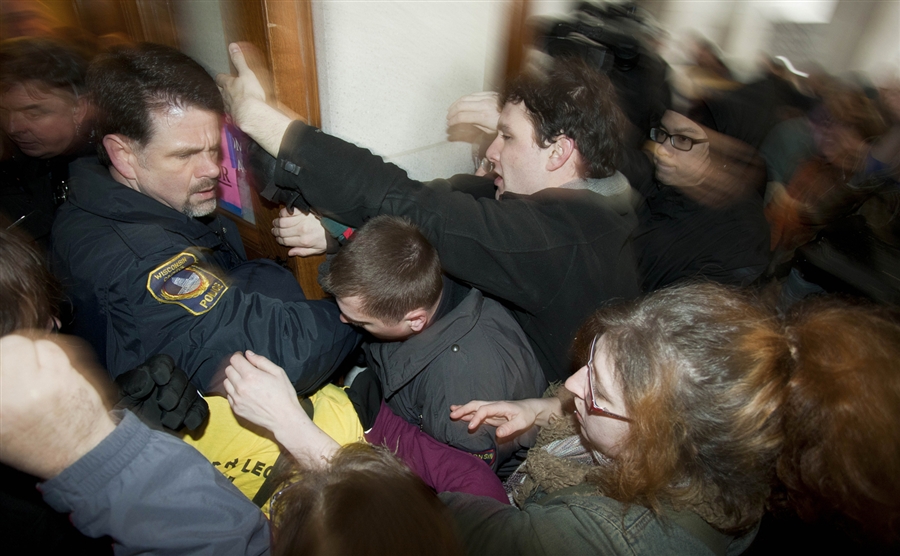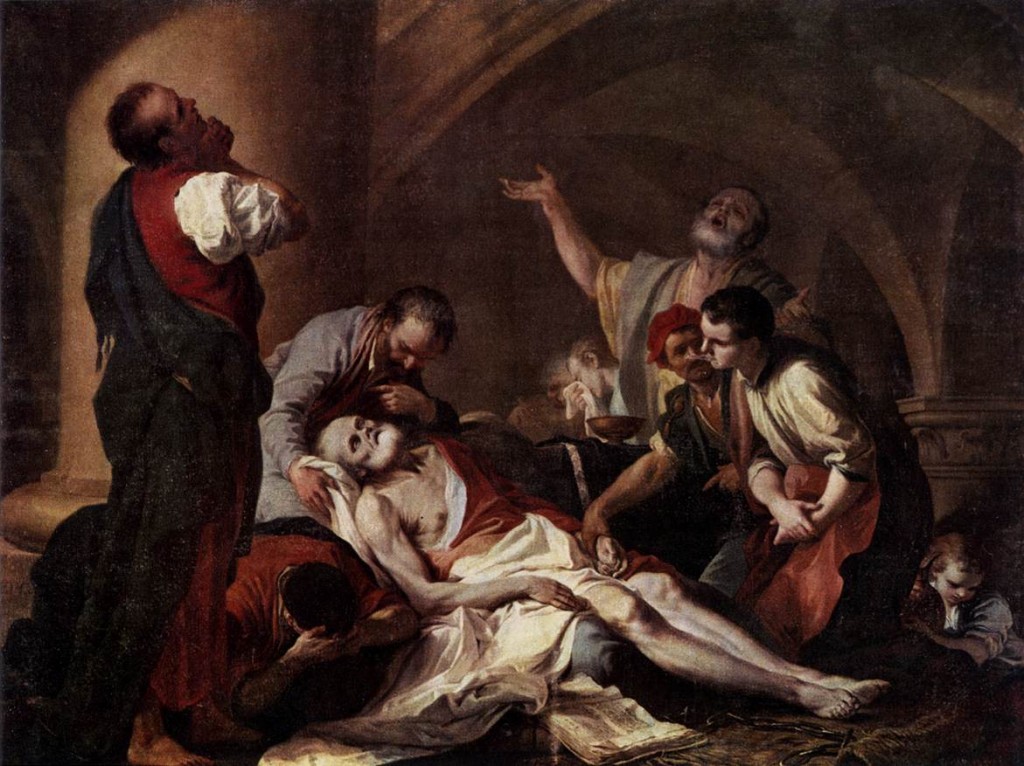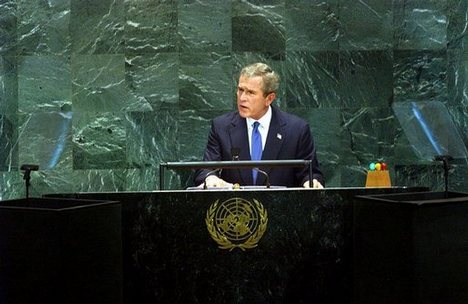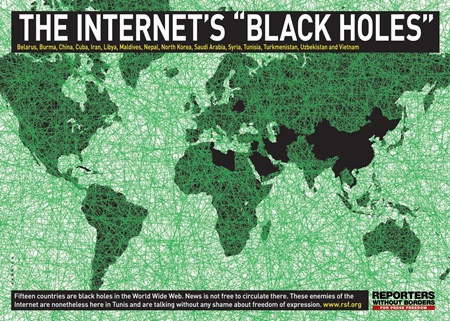After almost a month of turmoil and chaos in the Capitol Building of the state of Wisconsin, the State Senate of Wisconsin on the night of March 9th brought to a crashing halt the sense of drift and paralysis that the state’s legislative process had become. Unable to secure a quorum for a controversial budget repair bill as the minority party simply left the state rather than be present for their certain legislative defeat, the majority senate leadership determined to remove the quorum required elements of the bill and passed the rest, effectively overhauling the relationship between the government and its employees. Brought to an abrupt end was one of the most blatant attempts by politicians in state history to disenfranchise the voters who had elected the majority to perform precisely as they did. The vote was taken under the threat of violence, death threats, recall threats, and verbal intimidation by a vocal incensed crowd at the Capitol rotunda who overwhelming felt that the democratic process was defined not by the means of representative democracy, but instead by their individual sense of righteousness. The absent democrat politicians, caught by their distant refuge in another state, found themselves helpless to effect debate and could only watch from afar as their cherished relationship with public unions went directly up against the voters’ mandate, and was found wanting.


The result was a firm repudiation of the incestuous relationship that has developed over the last four decades between government and its public servants, who discovered that the the financial assets of a state could be hijacked by forcing the state to financially back the back the unions that turned around and invested in politicians who would toe the line and assure continued government growth and union largess. The changes are so profound in their effect on the balance equation of power for each side that the fevered process and the aftermath of the vote will change forever traditional concepts of the American experience of democracy, individual rights, and individual responsibility.
1) The Damage to the Concept of Representative Democracy: The Wisconsin battle forever changes the perception of America’s respect for the concept of representative democracy and reason for fair and conclusive elections. Starting with the debacle of the Presidential election of 2000, a progressive lack of respect for the elective process has developed. Neither the winners nor the losers of theat election have ever respected the outcome. The winners remain convinced of the visible voter fraud that pushed close states into the loser column, the lack of understanding and respect for the concept of electoral college election as outlined in the nation’s constitution, and the attempt to hijack the outcome by cherry picking specific votes over others that secured their vision of the election. The losers remain convinced that the popular mandate as determined by number of votes was definitive and warped by the electoral college process, and that the rights of individual voters, no matter how vague the capacity to discern their intent, were ultimately disenfranchised. The concept of a winning or losing an election and accepting the outcome became blurred by interpretation of the vote, so that modern elections for president or for local dogcatcher are poisoned with the same re-interpretation of voter intent, and elections often go for months without a declared winner.
Additionally, the loss in the election is seen as only a matter of interpretation, and not outcome, and the loser is under no obligation to accept the consequences. The dramatic repudiation of the direction of government declared by the Wisconsin voter last November with the election of overwhelming republican representatives in federal, state, and local positions was interpreted as an outburst of anger, not a mandate for change, and therefore one that could be ignored as the current anger against any change was felt to be equally as intense and therefore, as legitimate.
The result is the dangerously weakened compact of a representative democracy between the voter and the elected official. The idea that change can occur if the voter determines to vote for change, has been recklessly thrown away by the current Wisconsin chaos. The very strength of a democracy lies in the recognition by those whose ideas are on the losing side of the electoral process are accepting of that process, so that someday if their view prevails, the process will be accepting of their requested change. The current view, that some ideas are so critical that no representative should be able to debate them and hold them to scrutiny and change is anti-democratic and anathema to the balance that has permitted give and take in public discourse since the Civil War. Although the Wisconsin ordeal culminated in the eventual affirmation of representative democracy, the effort to immediately recall those Senators who represented their constituents in the manner mandated by their election distorts the reasons for having elections in intervals that allow the voter’s intent to evolve and be judged in outcome. As President Obama himself said in the healthcare debate when a minority politician expressed the opinion that their point of view was not adequately represented in the bill, “Get over it; we won.” As cold as that statement was, it was inherently American. If the voter finds the direction taken by their elected representative is against the majority will, they can always vote them out at the next election. Or at least, that is what the whole system of representative democracy is predicated upon.
2) The Sense of Entitlement: The previous four decades have seen the progressive entwining of public employees and the government that feeds them to the detriment of the society’s ability to improve itself. The securing of more and more generous rewards in the face of progressively poorer outcomes have left the future of the society to progress in doubt, and the funds to repair damage and invest in good ideas steadily swallowed up by entitlements. The Wisconsin debacle initiated with previous administrations continual shoving of key problems and investments down the road, in order to fund current guarantees to public employees that exceeded all reason or comparison with those of the private sector. The virulent response in particular of the teacher’s union exposed for all time their fundamental reason for existence was for the protection of perks, not the assurance of their product and professionalism. The cry “for the Children” is forever placed in the dustbin of all other progressive movements. When the choice came down to the acceptance of a modest responsibility in the rising costs of generous healthcare plans and pensions, the union declared its willingness to allow its own members to lose their jobs, rather than all sharing in modest sacrifice. The Union determined to take advantage of the stalemate in the legislative process to ram through local contracts protecting their entitlements, knowing full well the result would be the loss of jobs and more dramatically the elimination of educational opportunities and programs of the very students they were purportedly the stewards of. The protection of these perks in the face of crashing standards in education, devastating incapacities in the ability of students to read and perform math, the continuing tenure of teachers who conclusively show no ability to teach, the maintenance of immunity to the needs of society have been particularly exposed. It remains to be seen if the separation of the union from its subservient teacher monopoly will finally bear fruit in the objective appreciation of how far our educational process has fallen, and its standards contaminated.
3) The First Of Many Battles for the Future of a Distinct American Society: The Wisconsin experience proved that the entrenched interests created by government expansion into all of our lives has a parallel effect on Americans as it has had on Europeans, and that our unique set of individual rights and system of checks and balances do not protect the individual Americans against the tyranny of the entitlement class with any more assurance. Last year, when European governments attempted to reign in suffocating entitlements threatening the very existence of countries, the reaction of those entitled was virulent, rigid, and prolonged, and resulted in the governments backing down. This experience and the subsequent reaction in Wisconsin proves that it is not the “socialist” bent or lack thereof of a country’s makeup but simply a relative matter of numbers. When a sufficient number of the population rely more on the government to assure their futures then their own capacities, talents, and entrepreneurial spirit, the society will be helpless to affect change. This country’s progressive need to seek a governmental answer to every challenge or vagary in life is the single most determining factor in obstructing America’s future health and success. It is no small consideration that this process has eventually pulled down every previous historical dominant country and America will prove no different. The battle for the concept of individual rights and opportunity versus societal security is on, and Wisconsin was its first epic battle.
 The miracle that is Easter morning will be celebrated by over 2 billion people today in reflection and adoration of the triumph of life over mortality. The power of the messenger resonates with such clarity over the millenia that historical significance of the event still drives enormous academic study, and the religious significance unbounded in its power still to convert. The conceptualization of a miracle that frees man of his sinful character and provides a means for eternal salvation in a world that constantly torments is still the single most powerful philosophical force in humanity’s understanding of being, and continues to grow amongst all religions.
The miracle that is Easter morning will be celebrated by over 2 billion people today in reflection and adoration of the triumph of life over mortality. The power of the messenger resonates with such clarity over the millenia that historical significance of the event still drives enormous academic study, and the religious significance unbounded in its power still to convert. The conceptualization of a miracle that frees man of his sinful character and provides a means for eternal salvation in a world that constantly torments is still the single most powerful philosophical force in humanity’s understanding of being, and continues to grow amongst all religions.








